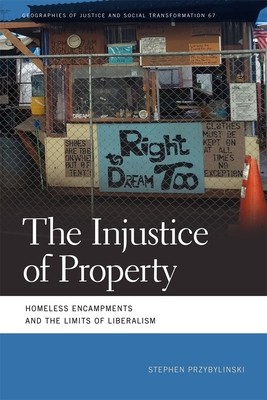
- We will send in 10–14 business days.
- Author: Stephen Przybylinski
- Publisher: University of Georgia Press
- ISBN-10: 0820366404
- ISBN-13: 9780820366401
- Format: 15.2 x 22.9 x 1.4 cm, kieti viršeliai
- Language: English
- SAVE -10% with code: EXTRA
Reviews
Description
With the rise of homelessness in many U.S. cities, municipal governments are sanctioning organized encampments as an official strategy for sheltering unhoused people. Examining the shortcomings and consequences of these municipal policies, The Injustice of Property explores how unhoused individuals living in self-managed encampments navigate and organize themselves within and against the confines of liberal property systems. Through ethnographic research in Portland, Oregon, a paradigmatic city in advancing this model of homeless shelter, Stephen Przybylinski details the everyday struggles of self-managed encampments to highlight how key contradictions inherent to liberal ideology maintain property as a means of structuring sociopolitical equality. He argues that justice cannot be realized for unhoused communities within the liberal model of private property due to how liberalism and liberal ideology prioritize the rights and values of property over the personal rights of self-governance.
The Injustice of Property is a conceptually robust and empirically rich account of the limits of liberal thinking regarding what "just" property relations look like for unhoused and housed people alike. The book shows that while encampment communities struggle to establish alternative property relationships to the traditional model of private ownership, the injustices that residents of encampments face provoke a necessary reevaluation of how beneficiaries of property systems influence who can become housing stable and on which terms. This insightful book reveals how the injustices surrounding Portland's encampment communities reflect the limits and injustice of liberal property more broadly.EXTRA 10 % discount with code: EXTRA
The promotion ends in 23d.13:00:01
The discount code is valid when purchasing from 10 €. Discounts do not stack.
- Author: Stephen Przybylinski
- Publisher: University of Georgia Press
- ISBN-10: 0820366404
- ISBN-13: 9780820366401
- Format: 15.2 x 22.9 x 1.4 cm, kieti viršeliai
- Language: English English
With the rise of homelessness in many U.S. cities, municipal governments are sanctioning organized encampments as an official strategy for sheltering unhoused people. Examining the shortcomings and consequences of these municipal policies, The Injustice of Property explores how unhoused individuals living in self-managed encampments navigate and organize themselves within and against the confines of liberal property systems. Through ethnographic research in Portland, Oregon, a paradigmatic city in advancing this model of homeless shelter, Stephen Przybylinski details the everyday struggles of self-managed encampments to highlight how key contradictions inherent to liberal ideology maintain property as a means of structuring sociopolitical equality. He argues that justice cannot be realized for unhoused communities within the liberal model of private property due to how liberalism and liberal ideology prioritize the rights and values of property over the personal rights of self-governance.
The Injustice of Property is a conceptually robust and empirically rich account of the limits of liberal thinking regarding what "just" property relations look like for unhoused and housed people alike. The book shows that while encampment communities struggle to establish alternative property relationships to the traditional model of private ownership, the injustices that residents of encampments face provoke a necessary reevaluation of how beneficiaries of property systems influence who can become housing stable and on which terms. This insightful book reveals how the injustices surrounding Portland's encampment communities reflect the limits and injustice of liberal property more broadly.

Reviews